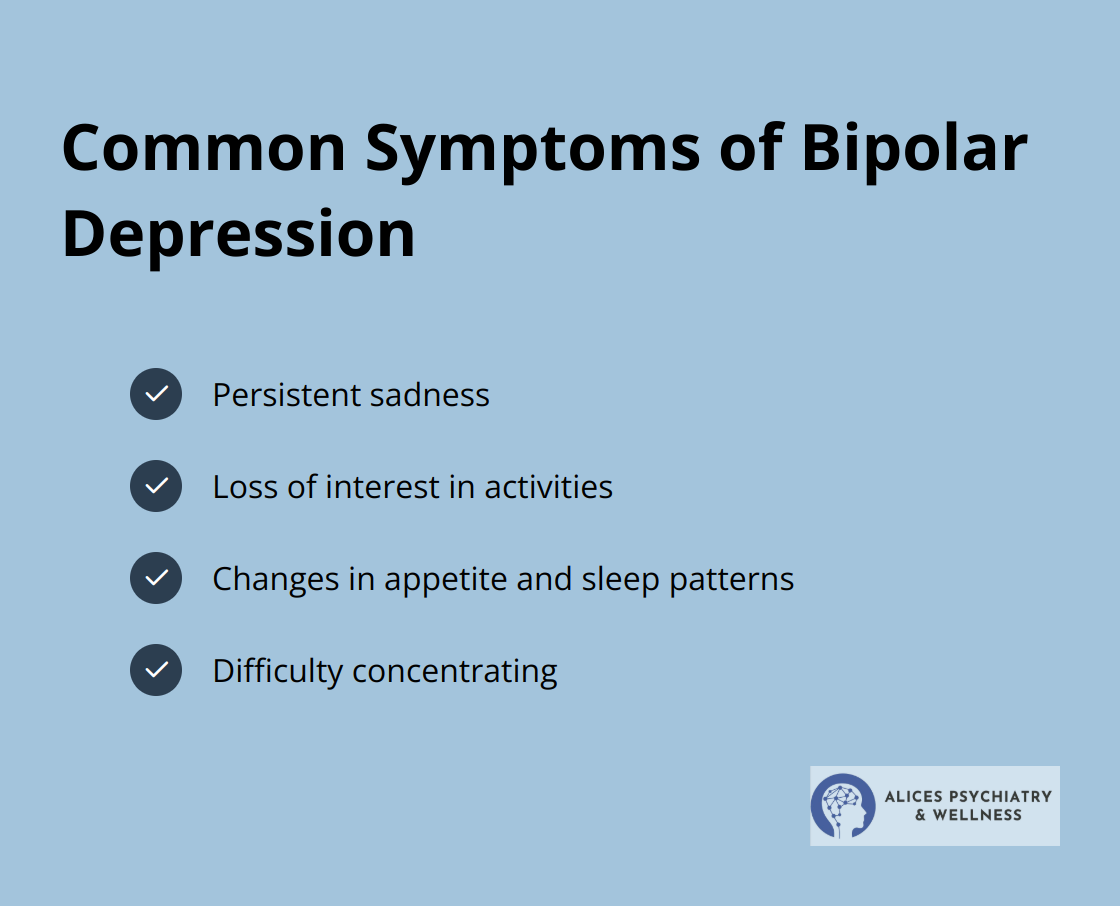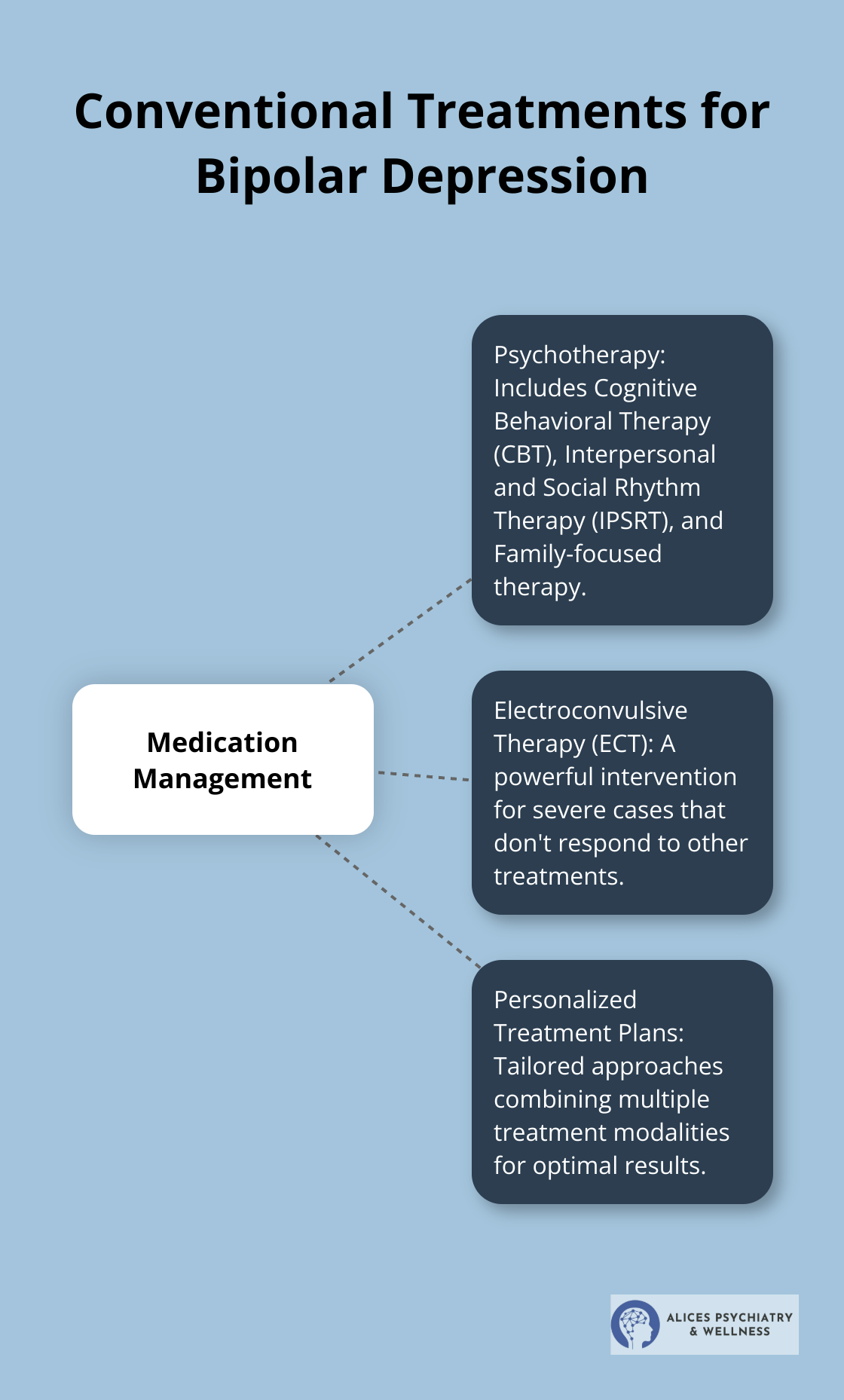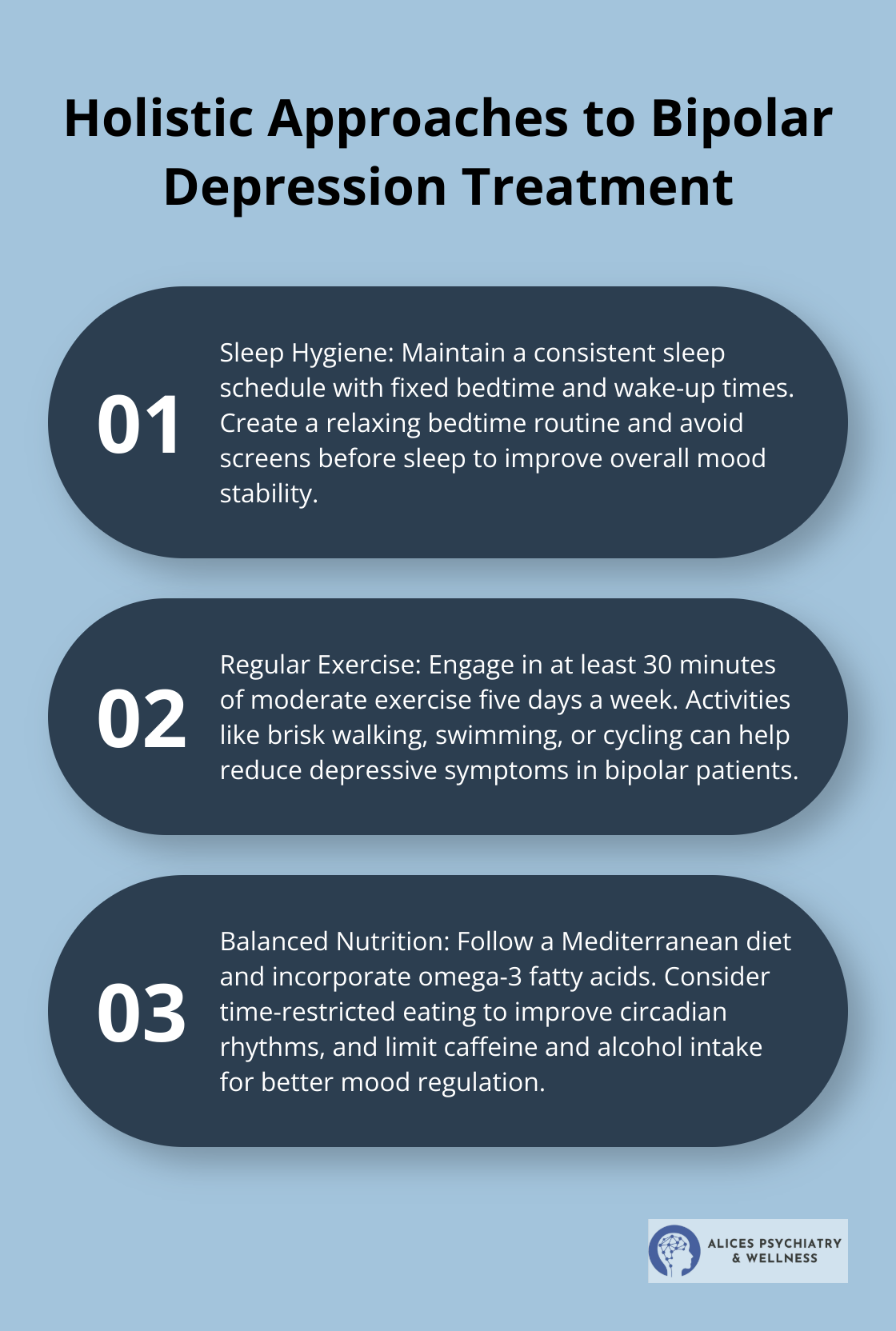At Alice’s Psychiatry and Wellness, we understand the complex nature of bipolar depression and its impact on individuals’ lives.
We believe in a comprehensive approach to treatment that combines conventional methods with holistic strategies.
This blog post explores various holistic treatment options for bipolar depression, offering insights into how these approaches can complement traditional therapies.
Our goal is to provide you with a well-rounded understanding of the available treatment options to support your journey towards better mental health.
Understanding Bipolar Depression
What Is Bipolar Depression?
Bipolar depression is a complex mental health condition that affects millions worldwide. It involves intense mood shifts that alternate between manic highs and depressive lows. Unlike unipolar depression (which only includes depressive episodes), bipolar depression is part of a larger disorder that encompasses both depressive and manic or hypomanic phases.
Recognizing the Signs
The depressive phase of bipolar disorder presents significant challenges. Symptoms often include:

In severe cases, individuals may experience thoughts of self-harm or suicide. It’s important to seek professional help if you or someone you know exhibits these symptoms.
The Bipolar Difference
A key distinction between bipolar depression and unipolar depression lies in the treatment approach. Antidepressants, commonly used for unipolar depression, can sometimes trigger manic episodes in people with bipolar disorder. This underscores the importance of accurate diagnosis for effective treatment.
Impact on Daily Life
Bipolar depression can significantly disrupt daily life and relationships. During depressive episodes, individuals often struggle with:
- Work performance
- Social interactions
- Self-care
The unpredictability of mood swings can strain relationships with family and friends. Many people report feelings of isolation or misunderstanding.
Managing Bipolar Depression
While challenging, bipolar depression is treatable. A combination of medication, therapy, and lifestyle changes can help manage symptoms effectively. Mood stabilizers (such as lithium or valproic acid) are often prescribed to prevent manic episodes while addressing depressive symptoms.
Cognitive Behavioral Therapy (CBT) has shown promising results in helping individuals cope with bipolar depression. A meta-analysis provides evidence that group psychoeducation could be an efficacious treatment as an adjunct to treatment as usual in reducing relapse rates of people with bipolar disorder.
Establishing a consistent sleep schedule, regular exercise, and a balanced diet can also play important roles in managing bipolar depression. These lifestyle factors can help stabilize mood and improve overall well-being.
As we explore holistic approaches to bipolar depression treatment in the next section, it’s important to remember that these methods can complement traditional therapies and potentially enhance overall treatment outcomes.
Effective Conventional Treatments for Bipolar Depression
Medication Management: The Foundation of Treatment
Medication forms the cornerstone of bipolar depression treatment. Mood stabilizers (such as lithium and valproic acid) serve as the first line of defense. These medications prevent manic episodes while addressing depressive symptoms. Lithium may be a better treatment choice in patients with a positive family history for bipolar disorder, mania-depression-interval pattern, and few previous episodes.
Antidepressants require cautious prescription, always in combination with mood stabilizers to avoid triggering manic episodes. Selective Serotonin Reuptake Inhibitors (SSRIs) are common choices, with fluoxetine showing particular effectiveness in bipolar depression.
FDA-approved antipsychotic medications (like quetiapine and lurasidone) help manage both depressive symptoms and potential psychotic features. Regular follow-ups ensure medication effectiveness and side effect management.

Psychotherapy: Complementing Medication
Psychotherapy enhances the effectiveness of medication in treating bipolar depression. Cognitive Behavioral Therapy (CBT) yields remarkable results in helping patients identify and alter negative thought patterns.
Interpersonal and social rhythm therapy (IPSRT) focuses on stabilizing daily routines and improving interpersonal relationships, significantly reducing mood episode frequency.
Family-focused therapy educates family members about bipolar disorder and improves communication within the family unit. This approach reduces relapse rates and improves overall functioning in patients with bipolar depression.
Electroconvulsive Therapy (ECT): A Powerful Intervention
For severe cases of bipolar depression that don’t respond to medication and psychotherapy, electroconvulsive therapy (ECT) can provide a life-saving intervention. ECT applies electrical currents to the brain to trigger a brief seizure, rapidly reversing symptoms of severe depression.
Modern ECT, while often misunderstood, offers a safe and effective treatment option. It proves particularly useful for patients with severe suicidal ideation or those who cannot tolerate medication side effects.
Personalized Treatment Plans
Each patient’s condition requires careful evaluation to determine the most appropriate treatment approach. A personalized care plan addresses the unique needs of each individual living with bipolar depression. This tailored approach often combines multiple treatment modalities for optimal results.
As we explore holistic approaches to complement these conventional treatments in the next section, it’s important to note that a comprehensive strategy often yields the best outcomes for managing bipolar depression.
How Holistic Approaches Enhance Bipolar Depression Treatment
The Power of Sleep Hygiene
Sleep disturbances often accompany bipolar depression and can worsen symptoms. A consistent sleep schedule proves essential. We recommend a fixed bedtime and wake-up time (even on weekends). A relaxing bedtime routine, such as reading or listening to calming music, signals to your body that it’s time to wind down.
Avoid screens at least an hour before bed, as blue light interferes with melatonin production. If racing thoughts plague you at night, keep a journal by your bedside to jot down concerns, effectively “parking” them for the next day.
Exercise: A Natural Mood Booster
Regular physical activity serves as a powerful tool in managing bipolar depression. A study in the Journal of Psychiatric Research found that exercise reduces depressive symptoms in bipolar patients. Try at least 30 minutes of moderate exercise five days a week.
Brisk walking, swimming, or cycling offer excellent options. For those new to exercise, start with shorter sessions and gradually increase duration and intensity. Consistency matters most – even a 10-minute walk can make a difference.

Nutrition: Fueling Your Mind and Body
A balanced diet plays a vital role in mood stabilization. Research indicates that time-restricted eating and Mediterranean diet guidance may have benefits for improving circadian rhythms in bipolar disorder.
Incorporate omega-3 fatty acids, found in fish like salmon and sardines, into your diet. These have mood-stabilizing properties. Limit caffeine and alcohol intake, as they can interfere with sleep and mood stability.
Mind-Body Practices for Emotional Regulation
Mindfulness and meditation serve as powerful tools in managing bipolar depression. A study found that mindfulness-based cognitive therapy appears effective for alleviation of depression and anxiety among bipolar disorder patients, possibly by improving emotional regulation.
Start with short, guided meditations – even five minutes a day can make a difference. Yoga offers another beneficial practice, combining physical activity with mindfulness.
Light Therapy: Harnessing the Power of Light
For individuals with bipolar depression (especially those with seasonal patterns), light therapy can help. A study in Bipolar Disorders journal showed that morning light therapy helps regulate circadian rhythms and improve mood.
Try using a light therapy box for about 30 minutes each morning, preferably within an hour of waking up. However, use this under professional guidance, as it can potentially trigger manic episodes in some individuals.
Final Thoughts
Holistic treatment for bipolar depression combines conventional and alternative therapies to provide comprehensive care. This approach integrates medication management, psychotherapy, and lifestyle modifications to create a robust foundation for recovery and long-term stability. The benefits of this combined strategy extend beyond symptom management to improve overall quality of life and enhance resilience.
We at Alice’s Psychiatry and Wellness offer personalized care plans that incorporate both traditional and alternative approaches. Our team of experienced practitioners guides patients through the process of finding the right combination of treatments. We ensure safety and effectiveness at every step of the journey.
The path to managing bipolar depression differs for each individual. A personalized, holistic approach allows for flexibility and adaptation as needs change over time. You can take a proactive step towards better mental health by exploring various treatment options with the right support.





